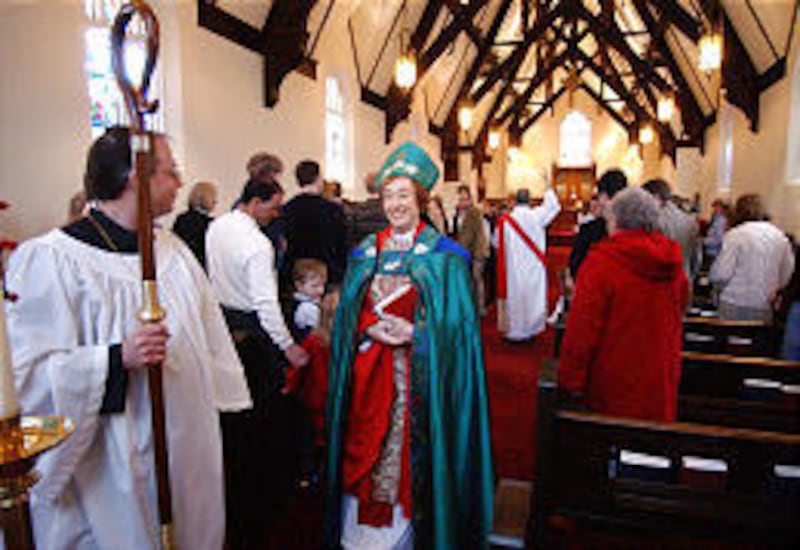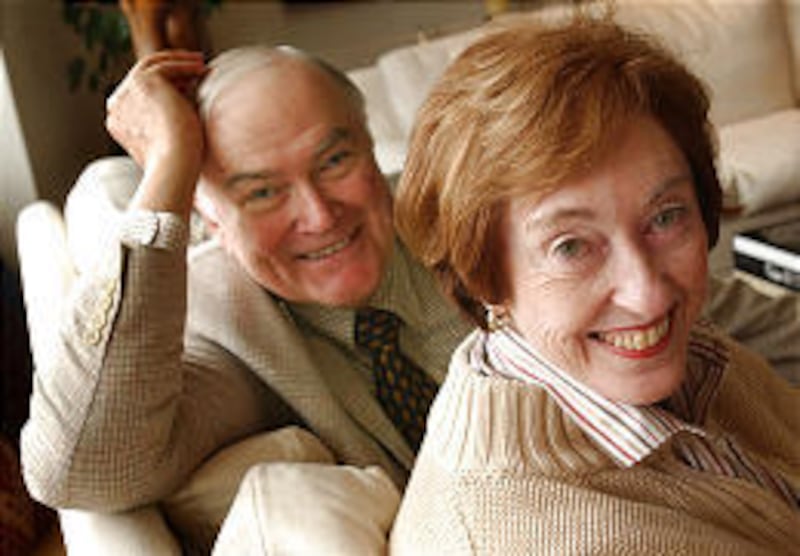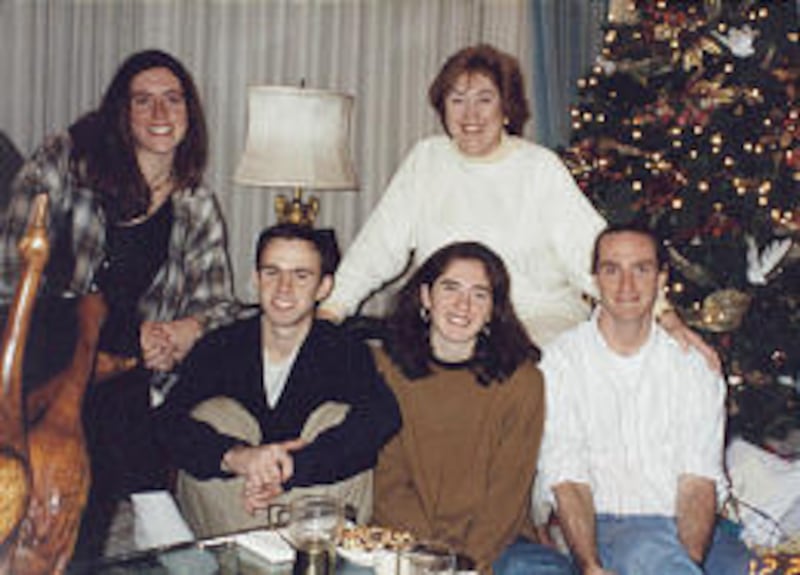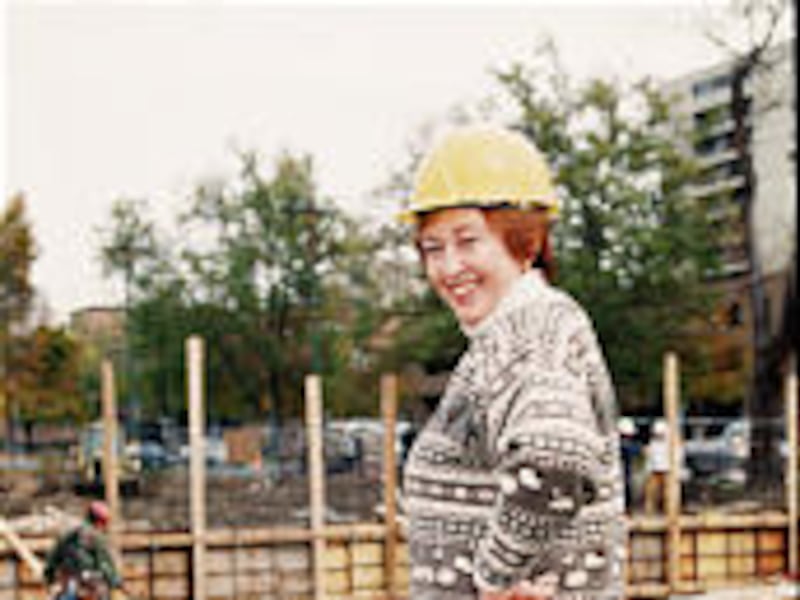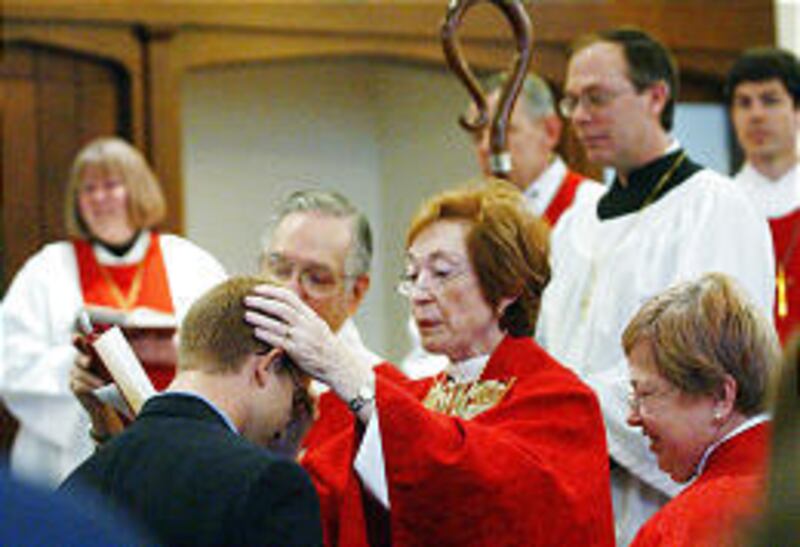It's never been easy for Carolyn Tanner Irish or the star-crossed family in which she was reared, but here she is, in her seventh decade, saying these are some of the happiest days of her life.
Why, then, does she sound almost apologetic about it?
"If anything, I'm embarrassed that my life is so wonderful when I see so many difficulties all around," she says.
But then she has had her share of those in her 63 years. The people who know her would say the good times are overdue. She has endured family tragedies, divorce, alcoholism and a long search for religion and her place in the world.
In many ways, her life has come full circle. Who knew she would find happiness and contentment back where she began. Who knew she would grow up a Utah Mormon and decades later return as a member of the Episcopal Church, as the bishop of Utah's Episcopal Church, as the first female ever to lead a church in Utah.
In Salt Lake City, where she was reared by philosopher-philanthropist-teacher-author-businessman Obert (O.C.) Tanner, she found a second husband, stared down her alcoholism and pioneered her church calling.
"I'm at one of the best points in my life," she says. "It just all came together. I have a deep satisfaction in my work. I'm crazy about my husband — he's one of the loveliest, kindest people I've ever known. Having a companion when you do a difficult job makes it a whole different thing than when you do it by yourself."
Bishop Irish has had many incarnations — LDS girl, dancer, dance teacher, student, intellectual, housewife, mother, Episcopal convert, Episcopal bishop — and now she has returned home.
Or has she?
Ask about her old friends, and she says, "There's a sadness there that what I do is not OK. I'm not blaming them. It wasn't a return to home and friends I had had. My friends are such a mix of everything that being of another faith wouldn't be an obstacle. But it might be for them. But many have said or written me at the time of my election as bishop that they weren't surprised, that they knew I'd do something like this.
"I have relatives who wouldn't be happy to see me because I've become non-Mormon. The trouble with being a minority is that you're defined as a non-something."
Notwithstanding, she has not approached her role timidly.
As religious leader of between 6,000 and 7,000 people, she has taken strong stands on social issues. She has spoken out in support of Bishop V. Gene Robinson, the first openly gay leader in the Episcopal Church, while also warning clergy not to ask her to perform same-sex weddings because she believes marriage is between a man and a woman.
She has taken on the cause of the environment and the working poor and immigrants, advocating low-income housing and speaking out against English-only laws.
She poked fun at the Legislature for a law saying churches wanting to ban guns from their premises had to publicize the ban by, among other ways, posting signs. She complied by placing giant signs, nearly 4 feet tall, on the doors of Episcopal churches, with a big red circle through a gun, and these words: "The Episcopal Church welcomes you — but not your guns." The signs earned mention in Newsweek.
"I don't think churches needed signs — so we overdid it," she says. "We wanted to tweak them for that."
Maybe this is why her assistant, Mary Kay Williams, says, "She's not afraid to jump in the fray. There are going to be people who don't agree with her on everything she does and says for her church, but they can't say they don't respect her honesty and integrity."
Deep LDS roots
Bishop Irish is a liberal, outspoken Episcopal leader in conservative LDS Utah, which is probably not the best way to win friends in her old home state, but she's getting along just fine, thank you.
"I don't have a lot of unpleasantness to deal with," she says. "I am treated very, very well. Even when people disagree on subjects, I haven't experienced ugliness. It's one of the nicest cultures I know of.
"I suppose what I want to say is that if people disagree with you or are disgusted by your beliefs, they don't feel they have to come up and tell you or write you letters. Most of the letters about (her support of Bishop Gene) Robinson were from outside the state. And neither of the big boys — the Mormons and Catholics — could have voted the way I did."
Her late father would approve of her independence and her stands on issues. He spent a lifetime tweaking and questioning the beliefs of his fellow Mormons and Utahns, and to know O.C. Tanner is to know Bishop Irish. "The fruit didn't fall far from the tree," one friend says.
Both sides of the bishop's family — the Tanners and Clarks — have deep roots in The Church of Jesus Christ of Latter-day Saints. Her ancestors were contemporaries of Brigham Young and Joseph Smith. O.C. Tanner grew up the youngest in a large, poor polygamist family, virtually abandoned by his father after the practice of polygamy was outlawed.
Obert began working to support his family when he was 5 years old. As a teen, he was shipped off to Canada to work on his father's ranch, but eventually his mother, Annie Clark Tanner, put her foot down — he would have an education — and that was that. All of her children who reached adulthood graduated from college, which was no small feat for a woman who eked out a living as a midwife.
Tanner fulfilled his mother's wishes and then some. He made a lifetime of studying and teaching and viewed a university the way a kid looks at a playground. He earned a law degree from the University of Utah and a master's in philosophy from Stanford.
By the time he died in 1993 at the age of 89, Obert had produced enough work for three lifetimes. He studied and taught at Stanford and Harvard and started a business in Salt Lake City, commuting to and from Utah to direct the Tanner Co., which specializes in making employee recognition awards. He amassed a fortune with the company and became a prolific philanthropist, endowing lecture series and building fountains, libraries and special rooms and heading up various community projects. He wrote nearly a dozen books, most of them on religious subjects. He championed the United Nations and represented the U.N. abroad, earning the nickname "Mr. United Nations."
But while he was out in the world working, there was sadness at home. Obert and his wife, Grace, had six children together. Only three of them reached adulthood. Dean, the oldest, died of polio when he was 10. Their grief drove the Tanners back to Utah from California.
Tragedy found them again. Another son, Steve, was run over by a car in the parking lot of the Brighton Ski Resort. A few years later, Gordon, 17 at the time, was killed in an automobile accident by a drunken driver. Just like that, more than half the family was gone.
"It was devastating and would have been for any family," Bishop Irish says. "It took my mom a long time to heal. Dad plunged into his work. It was a typical male response."
Work would prove to be therapy for Obert. Bishop Irish will say little about her two surviving siblings except this: "They don't have happy stories. Joan, she's become reclusive. Dave, he felt the expectations (of his father). He got into drugs. The deaths in the family were hard on her and my brother. But they are doing well now." Bishop Irish's mother, Grace, now 97, still lives in Salt Lake City.
"I think they've all struggled," says Kay Jorgensen, a close family friend for 30 years and senior vice president of human resources for the Tanner Co. "I think it comes from the loss of those three sons. They wondered, 'Why was I spared?' I think it's been hard for them. It changed the family dynamics. Their lives have all been a struggle. It fractured her parents.
"Obert's work became his life. My sense of it is that Grace didn't attach as much. There was a change. How could it not change you? The parents were never the same, and their relationships were never the same. I feel like Obert put himself into his work and left Grace at home to manage. I think Grace suffered more than anyone with the loss of her three sons."
Searching for meaning
The common family theme seems to have been a search for religion and meaning, a quest that Obert no doubt fostered. He was LDS but struggled throughout his life to reconcile his intellectualism with LDS doctrine, or the doctrine of any particular church for that matter. He taught philosophy at the University of Utah and invited students to question their beliefs.
Obert had a broad range of religious experience himself, serving an LDS Church mission, teaching religious philosophy, serving as chaplain at Stanford and becoming well-acquainted with church leaders such as Presidents David O. McKay and Gordon B. Hinckley, whose family attended the same ward as the Tanners. President McKay personally asked him to write a book on Christ's teachings for college-age students.
"Questions are good for a philosopher, but in the LDS tradition questions are not very welcome," Bishop Irish says. "In a general way, they have the answers, and people are expected to be satisfied with answers that are given."
It was never so in the Tanner household. At the dinner table on Sunday afternoon, Obert would start a debate about religious issues. "What did they tell you in church today?" he would begin. "Do you believe that?" he would reply to their answers. As Carolyn recalls, "He'd pick at it in some way so we'd think about it. He wanted to take it to another level."
David, who lives in California, eventually gravitated to Buddhism and the Dalai Lama. He is an activist for Tibetan causes and provides financial support for several Tibetans in their education. Joan, an artist who lives in New Mexico, "is still the seeker of the family," her sister says.
"Joanie is a free spirit," says Norma Matheson, whose husband Scott was governor of Utah and Bishop Irish's cousin. "I always liked her. She's a creative person. I own some of her artwork."
According to Jorgensen, Joan has dabbled in some of the practices of the Eastern religions but hasn't embraced a church. "All of Obert's children are uniquely spiritual," Jorgensen says.
None of the Tanner children has to worry about money, thanks to their father's inheritance, which has given them a certain freedom to search. (Obert's biography is titled "One Man's Journey: In Search of Freedom.")
Carolyn was closest to her father. In her words, she became the son he no longer had. "He taught me how to think," she recalls. She admired him deeply and became a confidant of sorts. When there were business or personal problems to consider, he liked to say to Carolyn, "Come on, honey, let's go walk around this together." In later years, he would ask her to serve as chairman of the board for the Tanner Co., a post she still holds today.
An awakening
Bishop Irish remembers a turning point in her life. She was 14 and bored with school, which came easily to her. She mused out loud that maybe she'd get a job. Her father answered by handing her a volume of essays by Thoreau. She read them, and "I was captivated," she says. "They're very humanistic. That was accessible to me in a way others my age wouldn't have been."
She became a prolific reader. She read the Harvard Classics, Plato, Emerson, Jefferson, Lincoln. She read novels. She memorized some of her readings.
Bishop Irish was always studious, but she was no egghead. She was elected drill mistress of the pep club. She took modern dance with Kathy Hinckley, the future LDS Church president's daughter. She rode her horse around the large plot of land that surrounded her house. She spent a year in New Zealand as an exchange student.
She graduated from Olympus High School, went to summer stock in theater and dance in Colorado, where she hoped to win an invitation to join a dance troupe in New York. A teacher put his arm around her and told her she was too thin-skinned for New York. She reluctantly gave up dancing, although she continued to choreograph productions at Stanford while studying there.
She enrolled at Stanford, married an aspiring lawyer named Lee Irish and transferred to Michigan, where she took an undergraduate degree in philosophy. She moved to England with her husband and earned a master of letters in moral philosophy from Oxford in 1968.
She became a devoted, involved mother of four children — "I was just crazy about my kids, and they're such interesting people," she says — while also teaching. Lee Irish eventually landed a clerkship with the U.S. Supreme Court, and eight years later he returned to Michigan to teach law school.
They were married for 28 years, and it ended badly. In 1988, at the age of 48, she was divorced. "That's an area of my life I'm not going to go into a lot," she says. "It's not a happy story except that I have four wonderful children from that marriage. We did the best we could."
By then she had experienced a religious awakening. At the age of 35, she had begun attending church again for the first time since she left home to go to college. "I thought philosophy was going to satisfy my spiritual needs," she says. "I know that sounds stupid, because it doesn't."
Initially, she returned to church solely for her children — "I wanted them to learn about Jesus," she says — but also because she longed for the sense of community and support that her mother had received from their LDS ward. "Everybody looked out for everybody," she says. "It was a wonderful ward."
She began by attending the Episcopal Church in 1975. "I was not looking for a church," she says. "I was surprised when I realized that this was my home."
By 1977, she began to consider entering the ministry herself. In 1979, she enrolled in seminary. With four children younger than 10, this was no small feat. To make it work, she got up at 4 a.m. and studied until 7.
She pauses as she tells this story and then smiles widely. "I had a direct experience to being called to that ministry of a priest," she says. "A sense that this was what I was really made for. This is what my life had been leading to. That was affirmed by the others I shared that with."
She flew to Salt Lake City to tell her father of her decision face to face. After being told, he sat silent for a long time and then smiled and said, "Of course." Says Bishop Irish, "He knew enough about the Anglican Church to know it had an intellectual tradition and it would appeal to me. It has a rich intellectual heritage of scientists, poets and philosophers."
As fate would have it, this was the time when the Episcopal Church began ordaining women. Shortly after graduating from the Virginia Theological Seminary in 1983, she was ordained a deacon and then a priest. She served congregations in dioceses in Washington, D.C., Virginia and Michigan.
Serendipity in Utah
In 1995, Bishop Irish was in Salt Lake City for a Tanner Co. board meeting. Jorgensen invited her to attend church with her the next day. As fate would have it, it was announced in church that Bishop George Bates would retire.
"It was serendipitous," Jorgensen says. "I had never been to church with her before or since."
On the drive home, Jorgensen asked her friend if she was qualified to serve as a bishop. Yes, she replied. Jorgensen told Bishop Irish she would nominate her and did. "I had never even heard her preach. I just had a sense of her presence," Jorgensen says.
In December 1995, Carolyn Tanner Irish was elected bishop of the Utah diocese. "This was a second home to our family, but I couldn't imagine moving back to Salt Lake," she says. "For all I knew, the Episcopal Church didn't exist there."
After 37 years of living out of state, she returned to Utah as only the third woman ever voted to serve as a diocesan bishop in the United States.
"I didn't know the church in the West very well," she says. "It's been a combination of invention and discovery. (Members of the Episcopal Church) are very conscious of Mormons. They live as a minority here. And I've heard it said that they saw me as a bridge person. Every bishop they had had was an Eastern white male.
"It has been very challenging and overwhelming. Some (inside the church) have a problem with a woman in authority. They can make it difficult for you to lead. I'm in a good place right now. It's the best it's ever been. It's good enough now to do some really good work."
Being a woman sent to a region dominated by another religion presented enough challenges, but there was one that proved even more difficult. In October 1999, at the urging of friends, she went public with her alcoholism and announced that she would take time off to seek help. She went to rehab, where doctors told her she would be the most difficult person they had ever treated because she was self-confident and successful.
"What I finally understood was that it was a drug," she says. "It's not immorality. It's a disease. There's a lot of shame that attaches to it. I was confronted by it by others. Close colleagues in the office. When people confront you, it's an alternative to going all the way to the bottom. All I want to say about this is that I share my story if it will help me to know that others know — so they don't keep offering me drinks. And I would always share my story with a suffering alcoholic. There were people who were sympathetic, and there were those who weren't. The LDS Church leaders were magnificent. They wrote me letters. I will never forget that."
She continues to participate in support programs to beat her disease. But her alcoholism and that time in her life — and for that matter, much of her family life — she declines to discuss in detail.
"In the Middle Ages, curiosity was regarded as a sin when you wanted to know something about someone's dark side," she says. "There is a lot of that out there about my family."
'I love my life'
Friends say the bishop's life took a happy turn when she married Fred Quinn 2 1/2 years ago. They had been friends for many years. A retired foreign service officer, he is a published author, a teacher at the University of Utah and serves as a substitute priest when he is needed. They originally met while working at the Episcopal Church in Washington.
"Her husband is wonderful, and he has just enhanced her life," Williams says. "Everyone who knew her before can see a wonderful new aspect of her life."
"I love my life," says Bishop Irish. "I have four great children. I have a wonderful husband. And I love my work."
Of her children, Bishop Irish likes to say, "They're not cookie-cutter children."
Stephen, 36, earned a master's degree in philosophy at Stanford. He collects rare books, speaks Spanish fluently and made a successful run on the TV game show "Jeopardy." He is single ("We're all on his case," says Mom) and is a devoted triathlete. "He isn't an academic, but he is an intellectual," Bishop Irish says. He is currently studying library science at the University of Indiana.
Jessica, 35, teaches media arts at Wellesley and, along with her husband, is an artist. "I have a wall of her paintings in my apartment," says her mother. She took a master's degree at the prestigious Chicago School of Art.
Thomas, 28, became a Catholic monk for a few years but left the order before taking final vows. He has a master's degree in philosophy from Cal-Berkeley and is applying for more graduate work in philosophy. He lives in Seattle.
Emily, 26, lives in Washington, D.C., after spending two years at Vassar. She is a massage therapist.
"Carolyn's children are interesting," Jorgensen says. "They are not materialistic in a lot of ways. A couple of them buy clothing at used clothing stores. They drive old cars. They don't live in big houses. They're all smart and like education and books and travel. They're not run-of-the-mill trust-fund kids."
As for Bishop Irish herself, she says she has found a measure of contentment but that the search never ends. "It's a journey," she says.
"Maybe the word is that she's found herself," Matheson says. "She's probably at peace with what she's doing. She's had to overcome a lot of personal obstacles that some people with less strength of character wouldn't have been able to overcome. She has a wonderful mind, and she's put it to good use."
Bishop Irish rises at 4 a.m. or earlier many mornings. Williams knows this because she receives e-mails from the bishop that were written in the wee hours. She says her prayers and studies her books and prepares for the day before most people are awake.
"She has a tremendous energy," Williams says. "She runs circles around us."
"She's one of the brightest women I've ever met," Jorgensen says. "And of course she's very spiritual. She has a presence. She and I were on a walking tour in England with 15 other people and on the last day the other people were saying, 'Who is she?' She's not a normal person. When she speaks, I want to listen. When people are around her they really defer to her. It's an incredible thing to watch."
Looking back on her life, Bishop Irish disputes the perception of most that she has had a difficult life.
"It's been messy because I didn't grow up knowing what I would do," she says. "I made changes and shifts and new commitments. I am a thankful person. I don't look back at hardships. I am blessed. I am grateful for each day."
E-mail: drob@desnews.com

